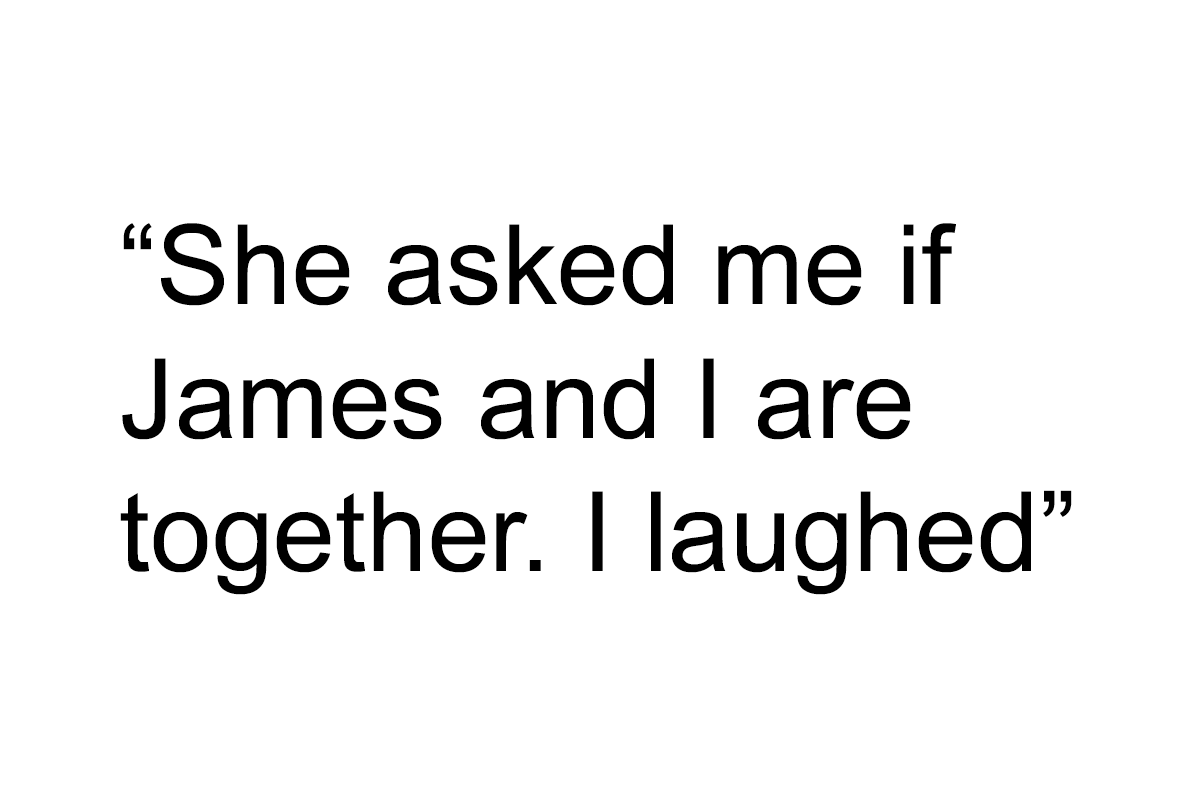
Woman Turns To Internet For Support After Her ‘Harmless’ Joke About A Friend Was Misunderstood, Receives No Mercy
“Sticks and stones may break my bones, but words shall never hurt me.” We’ve all heard the saying, but some people would argue it’s not correct. Words are powerful. It’s so important to mind what you say. Even when you’re making jokes.
Redditor u/blueisnotcreative proved that certain remarks can be incredibly hurtful. She asked the AITA community if she’s a jerk for joking about her formerly overweight friend. He didn’t find her ‘humor’ to be very funny. Neither did the members of the online group, who made sure to share their honest thoughts in the comments.
Bored Panda has discussed how other people can influence someone going through a body transformation with Dr. Kathleen Martin Ginis, a professor at the School of Health and Exercise Sciences, at the University of British Columbia.
Words can be hurtful, even if said as a joke, especially when it comes to sensitive topics, such as body image
Image credits: LightFieldStudios (not the actual photo)
Woman made a joke about her formerly overweight friend, and he didn’t seem to be too entertained by her ‘humor’
Image credits: nd3000 (not the actual photo)
Image credits: blueisnotcreative
When it comes to body image, jokes can often do more harm than good
The OP thought her joke was a compliment (a backhanded one, at best), saying that James looks way better now. In reality, her statement was far from praising, and it definitely wasn’t funny. Body image is a sensitive topic, which can make even an innocent joke a very hurtful thing to hear.
Image credits: Andrea Piacquadio (not the actual photo)
Dr. Kathleen Martin Ginis expanded on the effect such humor can have on a person after losing or seeking to lose weight. “Jokes are rarely helpful. Rather, they are a form of teasing that can undermine feelings about one’s self, one’s abilities, competence, appearance, value and worth,” she told Bored Panda.
“From an interpersonal perspective, jokes can undermine the person’s sense of trust and confidence in the person making the joke (and in others who might laugh at the joke). Jokes can make a person feel excluded, unsupported and like they don’t belong. They can also heighten a person’s self-awareness which we know often leads to feelings of shame, negative feelings about one’s body and one’s self, and negative emotions,” she said.
Support from friends and family is incredibly important for people on their weight loss journey
Some might think that body-shaming comments can motivate an overweight person to take action and start their journey towards a healthier lifestyle. Yet that couldn’t be further from the truth. In most cases, all it does is bring them down and can even lead to gaining more weight.
In addition to that, over 70% of people who receive comments about their looks on a regular basis tend to comment more on others’ themselves. It can start a chain reaction of negativity rather than encourage people to take care of their bodies.
Instead of spreading negativity, it’s better to actively show your support for people on their weight loss journey. Dr. Martin Ginis shared insight on some of the best ways to do it, saying that the first step should be simply asking “how can I support you?”
She added: “Other ways include offering to go for walks or hikes or participate in other forms of physical activity (i.e., be an exercise buddy) with the person; find ways of socializing that don’t involve eating; if food is involved in social activities, suggest a healthier-choice restaurant or build a home-prepared meal around a healthy option; let the person know they are not alone in their struggles and challenges, and share in their celebrations and successes.”
Some jokes can lead to body shaming—a problem people should be aware of in order to help put an end to it
Image credits: Ivan Samkov (not the actual photo)
Supporting people throughout their body transformation is very important. It helps to even out the balance scale—one of its sides is heavily weighed down by beauty standards coming from society. As much as we hate to admit it, certain body types often receive more praise than others. To make matters worse, not meeting the ‘standard’ might lead to body shaming.
“Body shaming is pervasive on social media platforms and people of all genders, ages, backgrounds, shapes and sizes are targets. Some consider body shaming a form of psychological abuse. As such, it is extremely psychologically damaging,” the professor told Bored Panda.
“There needs to be greater awareness of all the forms of body shaming (some perpetrators may not be aware they are doing it and need to be educated) and its consequences, as well as strategies to empower targets of shaming and their allies to shut it down,” she added.
Luckily, in the OP’s case, the internet made sure to let her know the ‘joke’ was far from funny.
Members of the online community condemned the woman’s jokes unanimously
Same, there's absolutely nothing I could add that wouldn't be profanity laden. Hopefully James has built up enough self esteem and confidence to totally ditch this shallow, gutter crawling, back stabbing, did-I-mention-shallow, blah-blah-blah... OP doesn't deserve a James. OP deserves to be single and alone until they realize how despicable they are. Okay, I'm done. Deep breath, back to my corner.
Load More Replies...James can look like Hemsworth or Elba for the rest of his life - he’s likely to always remember hurtful remarks like this, and coming from someone he thought he could trust… OP has no idea how vile she is
And as a former "fat" person, I will always see myself fat. I know that I'm currently average to fit, but body dysmorphic disorder hits hard. It can lead to eating disorders (to name only one), and this kind of remarks doesn't help....
Load More Replies...Same, there's absolutely nothing I could add that wouldn't be profanity laden. Hopefully James has built up enough self esteem and confidence to totally ditch this shallow, gutter crawling, back stabbing, did-I-mention-shallow, blah-blah-blah... OP doesn't deserve a James. OP deserves to be single and alone until they realize how despicable they are. Okay, I'm done. Deep breath, back to my corner.
Load More Replies...James can look like Hemsworth or Elba for the rest of his life - he’s likely to always remember hurtful remarks like this, and coming from someone he thought he could trust… OP has no idea how vile she is
And as a former "fat" person, I will always see myself fat. I know that I'm currently average to fit, but body dysmorphic disorder hits hard. It can lead to eating disorders (to name only one), and this kind of remarks doesn't help....
Load More Replies...












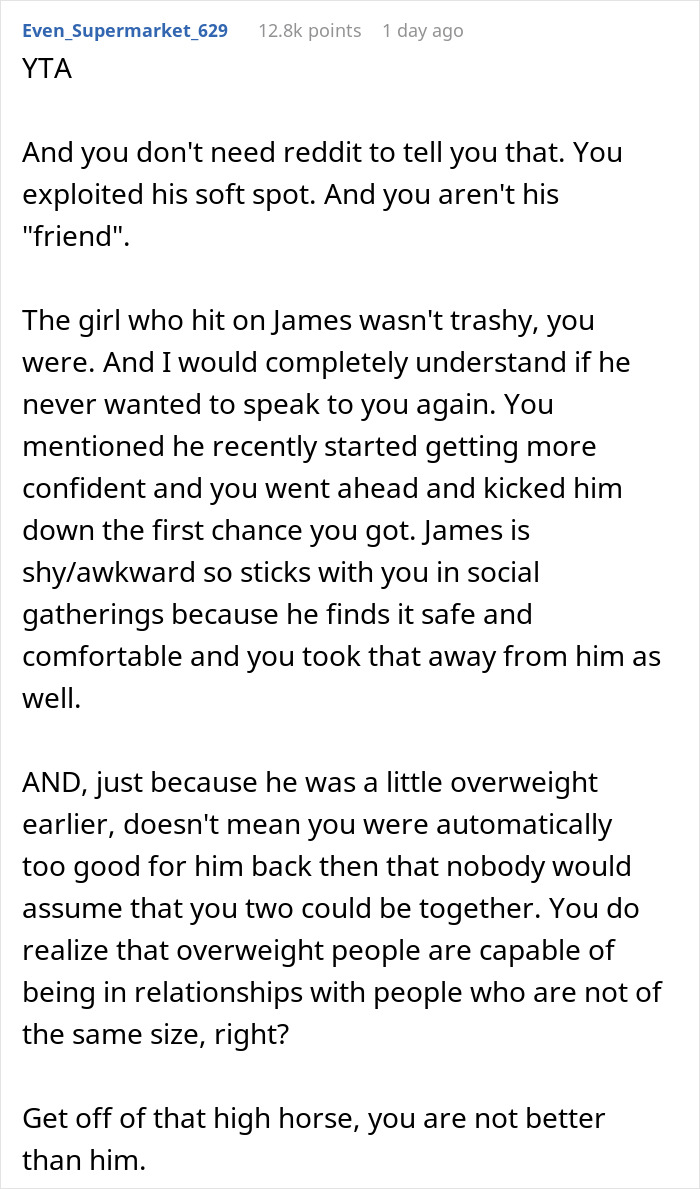
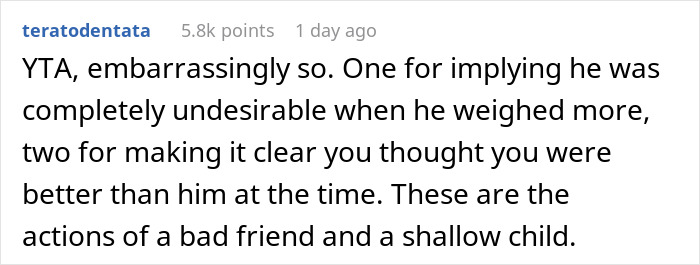

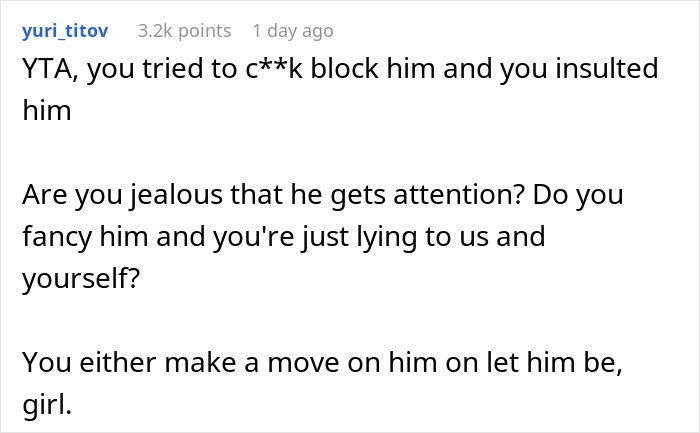




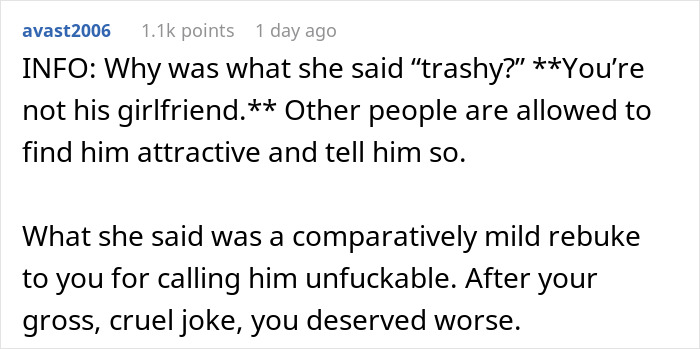










91
50